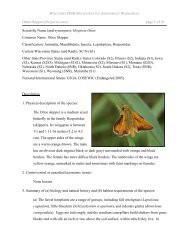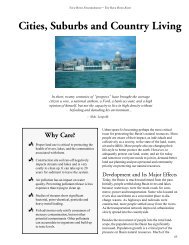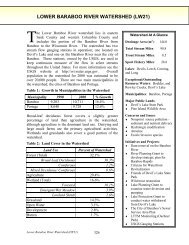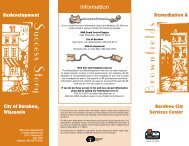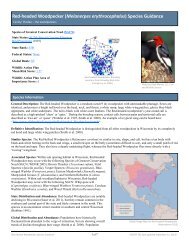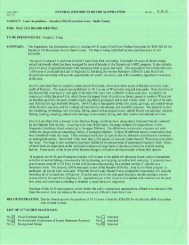Unit 1 [PDF] - Wisconsin Department of Natural Resources
Unit 1 [PDF] - Wisconsin Department of Natural Resources
Unit 1 [PDF] - Wisconsin Department of Natural Resources
You also want an ePaper? Increase the reach of your titles
YUMPU automatically turns print PDFs into web optimized ePapers that Google loves.
Ohio DOW Photo<br />
A 330 body-grip trap set for<br />
beaver. To be set legally in<br />
<strong>Wisconsin</strong>, trapping regulations<br />
require this trap be at<br />
least half underwater.<br />
When furbearers are too low,<br />
biologists can shorten seasons<br />
or take other steps to allow<br />
the population to increase.<br />
<strong>Wisconsin</strong> requires trappers<br />
to use tag traps with specific<br />
identification information.<br />
Chapter 6 - Trapping Regulations<br />
Legal Restrictions for Trapping Nuisance Animals<br />
Chapter 12.10 <strong>of</strong> the <strong>Wisconsin</strong> Administrative Code provides information regarding<br />
the rules and penalties related to nuisance wildlife control. These rules<br />
are summarized in a “Nuisance Wildlife Guidelines” handout, which needs to<br />
be reviewed before conducting any animal damage control work or removing<br />
nuisance wildlife. The handout can be found on the <strong>Wisconsin</strong> DNR website.<br />
Know and Understand the Trapping Regulations<br />
Violations <strong>of</strong> <strong>Wisconsin</strong>’s hunting and trapping regulations can be criminal<br />
<strong>of</strong>fenses. Conservation wardens and judges recognize the difference between an<br />
unintentional violation and willful intentions to poach animals out <strong>of</strong> season or<br />
by illegal means. Ignorance <strong>of</strong> trapping laws is not an excuse.<br />
Upon conviction <strong>of</strong> a trapping violation, a judge may impose fines or jail time.<br />
Trappers convicted <strong>of</strong> serious violations may also have traps, firearms and even<br />
vehicles confiscated by the court. Judges can also revoke licenses and suspend<br />
privileges to trap in the future.<br />
Reporting Wildlife Violations<br />
As a trapper, you may learn about trapping violations that need to be stopped.<br />
Never confront a violator or get directly involved without a conservation warden<br />
present. Instead, observe the situation and quickly report it to your local<br />
Conservation Warden. Provide descriptions <strong>of</strong> the violators, vehicles, license<br />
plate numbers, locations, dates, and times.<br />
Most states have established programs to stop poaching with toll-free telephone<br />
numbers to call when you need to report a violation. These programs go<br />
by names such as “TIP” which stands for “Turn In a Poacher.” Many states provide<br />
rewards for information that leads to the arrest and conviction <strong>of</strong> violators.<br />
Callers can remain anonymous.<br />
The <strong>Wisconsin</strong> TIP-WDNR line is: 1-800-TIP-WDNR (1-800-847-9367)<br />
<strong>Wisconsin</strong> Trapper Education Manual 64


![Unit 1 [PDF] - Wisconsin Department of Natural Resources](https://img.yumpu.com/18098067/72/500x640/unit-1-pdf-wisconsin-department-of-natural-resources.jpg)
![Nature program winter schedule [PDF] - Wisconsin DNR](https://img.yumpu.com/22471254/1/190x245/nature-program-winter-schedule-pdf-wisconsin-dnr.jpg?quality=85)
![City of Middleton [PDF] - Wisconsin Department of Natural Resources](https://img.yumpu.com/22300392/1/190x245/city-of-middleton-pdf-wisconsin-department-of-natural-resources.jpg?quality=85)
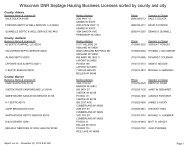
![Wetland Conservation Activities [PDF] - Wisconsin Department of ...](https://img.yumpu.com/21975633/1/190x245/wetland-conservation-activities-pdf-wisconsin-department-of-.jpg?quality=85)
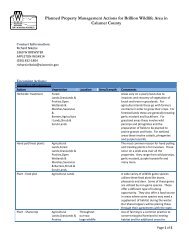
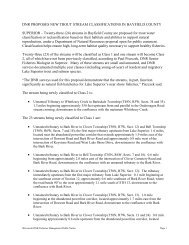
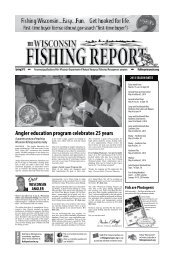
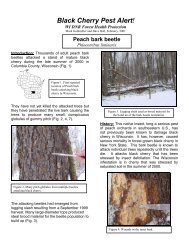
![Baraboo River Region[PDF] - Wisconsin Department of Natural ...](https://img.yumpu.com/21975619/1/190x245/baraboo-river-regionpdf-wisconsin-department-of-natural-.jpg?quality=85)
